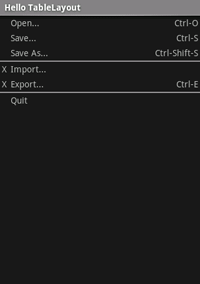{@link android.widget.TableLayout} is a {@link android.view.ViewGroup} that displays child {@link android.view.View} elements in rows and columns.
res/layout/main.xml file and insert the following:
<?xml version="1.0" encoding="utf-8"?>
<TableLayout xmlns:android="http://schemas.android.com/apk/res/android"
android:layout_width="fill_parent"
android:layout_height="fill_parent"
android:stretchColumns="1">
<TableRow>
<TextView
android:layout_column="1"
android:text="Open..."
android:padding="3dip" />
<TextView
android:text="Ctrl-O"
android:gravity="right"
android:padding="3dip" />
</TableRow>
<TableRow>
<TextView
android:layout_column="1"
android:text="Save..."
android:padding="3dip" />
<TextView
android:text="Ctrl-S"
android:gravity="right"
android:padding="3dip" />
</TableRow>
<TableRow>
<TextView
android:layout_column="1"
android:text="Save As..."
android:padding="3dip" />
<TextView
android:text="Ctrl-Shift-S"
android:gravity="right"
android:padding="3dip" />
</TableRow>
<View
android:layout_height="2dip"
android:background="#FF909090" />
<TableRow>
<TextView
android:text="X"
android:padding="3dip" />
<TextView
android:text="Import..."
android:padding="3dip" />
</TableRow>
<TableRow>
<TextView
android:text="X"
android:padding="3dip" />
<TextView
android:text="Export..."
android:padding="3dip" />
<TextView
android:text="Ctrl-E"
android:gravity="right"
android:padding="3dip" />
</TableRow>
<View
android:layout_height="2dip"
android:background="#FF909090" />
<TableRow>
<TextView
android:layout_column="1"
android:text="Quit"
android:padding="3dip" />
</TableRow>
</TableLayout>
Notice how this resembles the structure of an HTML table. The {@link android.widget.TableLayout}
element is like the HTML <table> element; {@link android.widget.TableRow} is like
a ><tr>> element;
but for the cells, you can use any kind of {@link android.view.View} element. In this example, a
{@link android.widget.TextView} is used for each cell. In between some of the rows, there is also a
basic {@link android.view.View}, which is used to draw a horizontal line.
public void onCreate(Bundle savedInstanceState) {
super.onCreate(savedInstanceState);
setContentView(R.layout.main);
}
The {@link android.app.Activity#setContentView(int)} method loads the
layout file for the {@link android.app.Activity}, specified by the resource
ID — R.layout.main refers to the res/layout/main.xml layout
file.
You should see the following:
